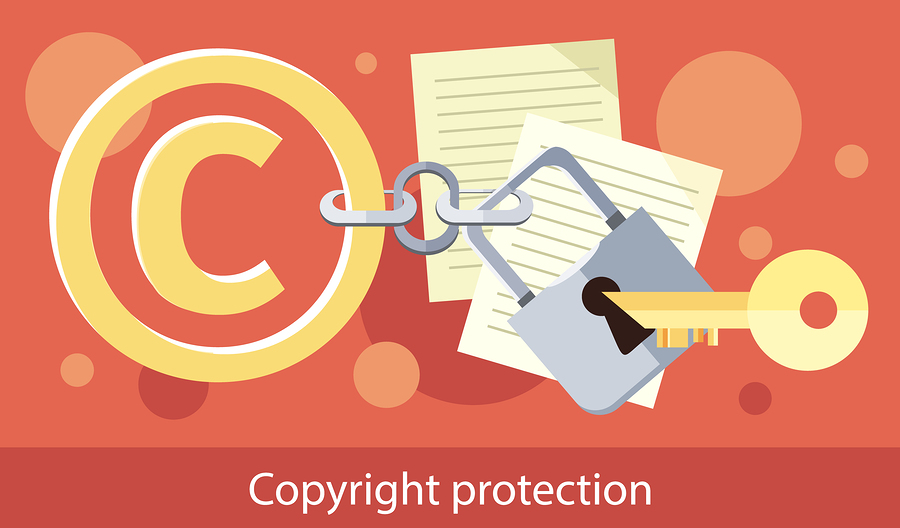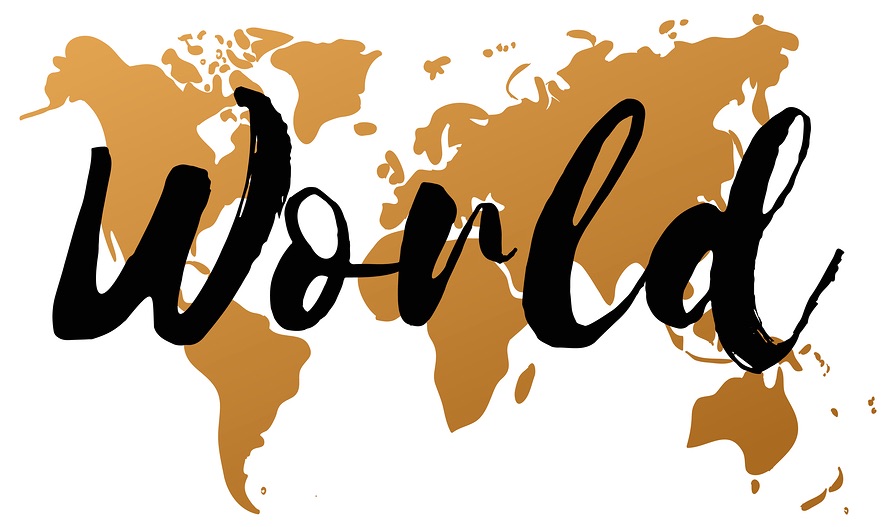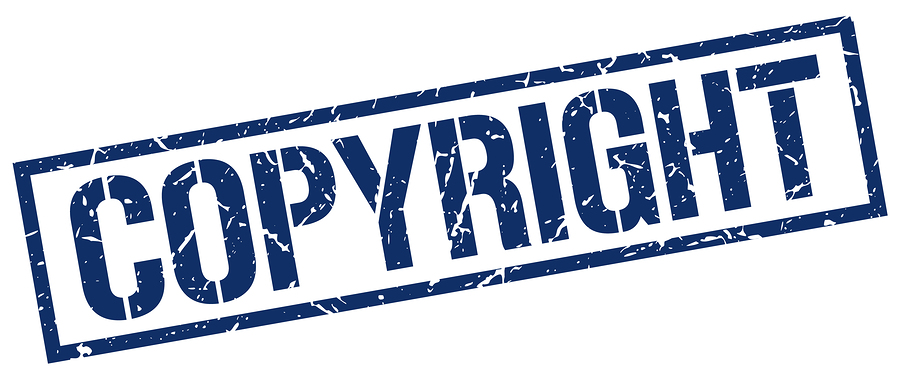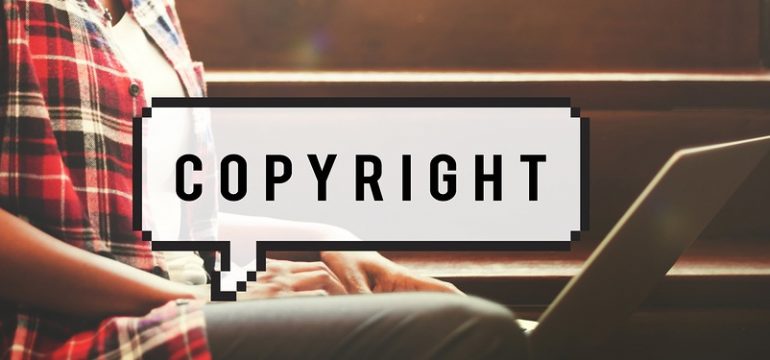Business owners must keep up with a lot of different things. From payroll to software to recruiting tools and other areas, it’s hard to keep up with some of it.
One area that brands cannot afford to forget is the issue of copyright.
Copyright deals with intellectual works that are in written form such as books, songs, movie scripts, and other written works. While most businesses do not have to deal directly with copyright on a daily basis, there may be times when you need to refer to our use parts of someone’s eBook, document, or other paper to enforce your credibility.
Copyright Law is so comprehensive and varies so much between countries, that it would be impossible to include it all in one post. Volumes have been written about copyright law in the past, and it continues to evolve and change. This is likely why there is no much confusion over the law regarding copyright and trademarks.
Rather than try to include too many different facets of the law, we have included some key elements of copyright from some of the primary countries that brands deal with that will help you make sense of the facts.

U.S.A. Copyright Summary
The United States’ first copyright laws went into effect with the Declaration of Independence and Thomas Jefferson, as he tried to help establish some reasonable boundaries of what could legally be used by readers of copyrighted material.
His goal was to protect the writer from having their works copied, denied credit, or used in ways that they did not approve so that they author of the intellectual works retained legal control over what happened to the works.
Over the years, the time that copyright could be claimed has changed and has been lengthened in every instance. Currently, the law is the “author’s life plus 70 years” in general, though some are protected for up to 120 years after the death of the author.
Also, copyright in the U.S. established boundaries on how such materials can be used. For instance, you cannot legally place articles written by someone else on a website without their giving you full permission and selling the copyright claim to you.
Today’s ruling, because of the internet, is that anything written is automatically bestowed the copyright on that writer, until such time that they sell the work to another party. In such cases, the purchaser of the article or book owns the copyright.
Copyright affects any and all print works that someone does in which they claim ownership, and you must, in all cases, secure the permission of the work before publishing any part of it yourself.
Some of the most common misconceptions about copyright include:
- “I can publish a work if I purchase it.”
- “I’m okay as long as I give credit.”
- “No one will know.”
All of these ideas are wrong and can get you into a great deal of hot water in the U.S. for following them. If you have permission and have purchased full rights or usage rights on articles or books, the first one is correct. Otherwise, you could be violating copyright law.
Given credit or attribution is not enough to avoid copyright violations. You must have written permission of the author to publish it.
The third one is just crazy. In our world of digital technology and communications, people will know in a second when you’ve published their work. Ever heard of Copyscape?

Australian Copyright Laws
Australia is more lax on their copyright laws than the U.S. and some circles of Australia even joke about “bootlegging” being popular. This does not make it right, however, and some Australian artists are forming ad hoc groups to change this.
UK and England
The United Kingdom, Great Britain, and England have recently updated their rules on copyright to reflect the digital age. You can see all of the changes that have gone into effect recently here. Digital photos, music, pictures, and other media all have requirements for notices of copyright. However, remember that copyright does not cover everything.
The truth is there are other countries that have various copyright and trademark laws in place too that vary greatly from these country’s laws. How are you going to keep it all straight?
More Country Copyright and Trademark Laws
In a previous post, we talked about copyright law and how it varies between countries. It’s important for the business owner to be well-versed on as much about copyright as possible. It affects many situations in any business, especially those having to do with publishing and trademarks.
While copyright is impossible to cover thoroughly in any single article, today we will look at laws of copyrights of some other countries, in case you do business in these countries and need to understand how copyright law plays out there.
Canada
Canadian copyright laws, like the United States and other countries, have changed and evolved over the years. With the onset of digital and electronic media, there have been additional changes to reflect the digital form such as sound recordings and other formats to protect artists of such works. In 2012, the passage of the Copyright Modernization Act in Canada focused on special protection of digital media. Sound recordings, as of June 23, 2015, are also a protected work in Canada, including unpublished or published works created on or after that date. Copyright in Canada lasts 70 years or 100 years past the date of fixation as work.
Mexico
Mexico honors copyright for 100 years past the author’s death, which is one of the longest-standing copyrights in the world. This means that works written by a Mexican author or composed or created by a Mexican artist would not be in the public domain until 100 years after the author’s death.
China
It might surprise you to know that China’s copyright laws closely echo those of the United States. They previously signed onto the Berne Convention rules of copyright and the Trade-Related Aspects of Intellectual Property Rights which sets minimum standards for copyright regulation.
These rules guarantee writers, musicians, and artists of all kinds automatic copyright ownership for any work they produce without formal registration of such works with the copyright or trademark office.
Also, China’s federal copyright regulations also resemble the U.S. laws by extending a registered copyright for 50 years after the author’s death. The U.S. allows copyright for 75-95 years now after the death of the author.
France
France has a similar copyright regulation to the U.S. as well, guaranteeing automatic copyright protection upon completion of work plus 70 years after the author’s life. If you use a musical, artistic, or intellectual work without written permission within this time frame, you could be sued for infringement and face both criminal and civil penalties.
In a country so rich in artistic and intellectual prowess, it’s understandable that France would have strict codes for copyright. So many of their other laws are a bit more lax. But they are serious about protecting the works of artists and musicians, as well as any other artists.
One interesting difference in the copyright laws of France is that they also protect any soldier “who died for France” for an additional 30 years.

Summary of Country – Specific Copyright and Trademark Laws
It can be safely generalized that in most countries, there is an expiration of 70 years past the author’s death for most copyright claims. This means that, after around 70 years past the author’s death, it would be safe to use a work that someone in most countries composed or created, provided the copyright was not renewed.
However, care and due diligence should be given to check with the country’s copyright or trademark office to see if specific types of registration are needed to register works in these countries. Business people should also contact their respective copyright offices before attempting to use any material in those territories. Because copyright can vary in other ways, such as how it is used on other websites or publications, specific written requirements for the use of copyrighted material and so forth, you should always check the office of copyrights rather than go by any guide that attempts to summarize the laws.
Notifications of Copyright
An additional requirement in most countries is that you issue a notification of copyright with your name and the date of publication. If this notice is not present, in most cases, it does not give someone permission to use the work, and there may still be legal penalties for using it. However, the copyright holder has an obligation to issue the notification in an obvious location so that others know the work is protected.
Published vs. Unpublished Works
Another key feature to keep in mind of copyright is that there is a difference between published and unpublished works regarding protections. While U.S. copyright law protects both, as most countries do, a notification of work as “published” must be noted somewhere or it must be otherwise obvious that the work is published, as well as the date of publication. This records the date of publication and corresponding copyright in either real or virtual form so that it can be referred to in the future if needed.
There are also “fair use” laws that allow the limited use of work in an educational setting (for non-profit) or certain other situations. Due diligence should also be done on this matter with the respective offices of copyright in these countries.
Idea for Using Material in Multiple Countries
Since the copyright laws are so diverse in various countries, if you are dealing with some different countries, it is wise to go with the most restrictive law in all of the territories and err on the side of caution, rather than risk huge fees and legal ramifications for the infractions.
United Kingdom
England and the United Kingdom have specific copyright laws, depending on the type of copyright you are seeking. A “crown copyright” is good for 50 years from the first commercial publication. Photographs created before June 30, 1957, have a copyright life of 70 years after the creation if unpublished and 70 years after publication.
About Posthumous Works
Some posthumous works can be copyrighted after the author’s death by another person who is the owner of the copyright and copyrights, in most countries, may be “willed” by an author before his death.
As stated before, there is much more to copyright law than we could ever put in a blog post. But this gives you a starting point on some of the regulations that various countries use for copyright. Trademark is an entirely different matter and is used more for business purposes than for the copyright of intellectual property.
A Word About Trademarks
A trademark cannot be placed on works of literature, music, or intellectual or artistic property that is written out.
Trademark is reserved for specific identifying factors of a brand or business that the owner wishes to protect.
The easiest way to deal with copyright and trademark law is to rely on a company that understands it to carry out the legal aspects.
When you create an original logo for your business, you need to know that it is protected, no matter what country you are in. This gives you security in knowing that no one can use your logo or branding materials without your written permission.
Knowing where your logo and trademark is used is an important part of the laws regulating trademark. For other laws by country, visit: https://commons.wikimedia.org/wiki/Commons:Copyright_rules_by_territory
For information on how we can help you protect your logo and design your logo for you, visit us at logodesignteam.com.
And What about Trademarks?
Trademark is another thing. Trademark is the official symbol, word, or words legally registered to represent a brand, company, or product. Companies have become particularly picky about how their brand identity is used in various contexts. There have been numerous new lawsuits across the world and in various companies claiming trademark infringement.
Whey do brands worry so much about people misusing their trademark?
Because your name is everything and your trademark and logo are all tied up in this.
If your trademark and logo are not secure, and people are allowed to put it on their websites, without your control of where it goes, how it is used, or whether you are even given credit, what does this do to your brand?
The answer: Nothing good!
How could you possibly control the outcome of numerous people, companies, and other entities using your logo or trademark in a negative way?
This is why these laws are in place, and they are there to protect you.
A Simpler Solution
The law can be quite complicated. It can even be scary, either for the idea that you could somehow inadvertently trample on someone’s copyright or logo or trademark and have to pay fines and do prison time, or because you want to protect your copyrights and logos and trademarks from others doing the same.
Unless you are a lawyer or plan to spend a bulk of your time studying copyright and trademark regulations in every country in the world that you deal with, the best solution is to entrust this process to a company that knows the score.
At Logodesignteam.com, we’re not lawyers either. But we do know the law when it comes to our business. We create custom-designed logos and help you secure the trademark of your logo so that you don’t have to worry about the legalities.
We also furnish you with a certificate that you own the trademark.
How does this protect you?
If someone uses your logo or trademark illegally or for any purpose that results in damages to your reputation or your company, you can seek legal action against them.
The proof of trademark ownership which we can secure for you is all you need to pursue legal action against anyone who would take advantage of your official branding or logo and create problems for your online reputation.
Start with our page that tells you about our special package deal known as The Best Seller Package.
When you enlist us as your official logo designers, we also secure the legal trademark for your logo, and you get the following:
- 8 original designs
- 8 designers
- 2-day turnaround time
- Unlimited revisions
- 2 redraws
- Full copyright/trademark ownership
We have many other deals too if you prefer to shop around. But this package covers everything you need to ensure that you get the best custom-designed logo money can buy and legal protection too.
Who could ask for anything more?
We can create your new logo, secure it with the patents and trademark office and give you full rights to your logo.
Deal with us, no worries for trademark or patents. Contact LogoDesignTeam today!







